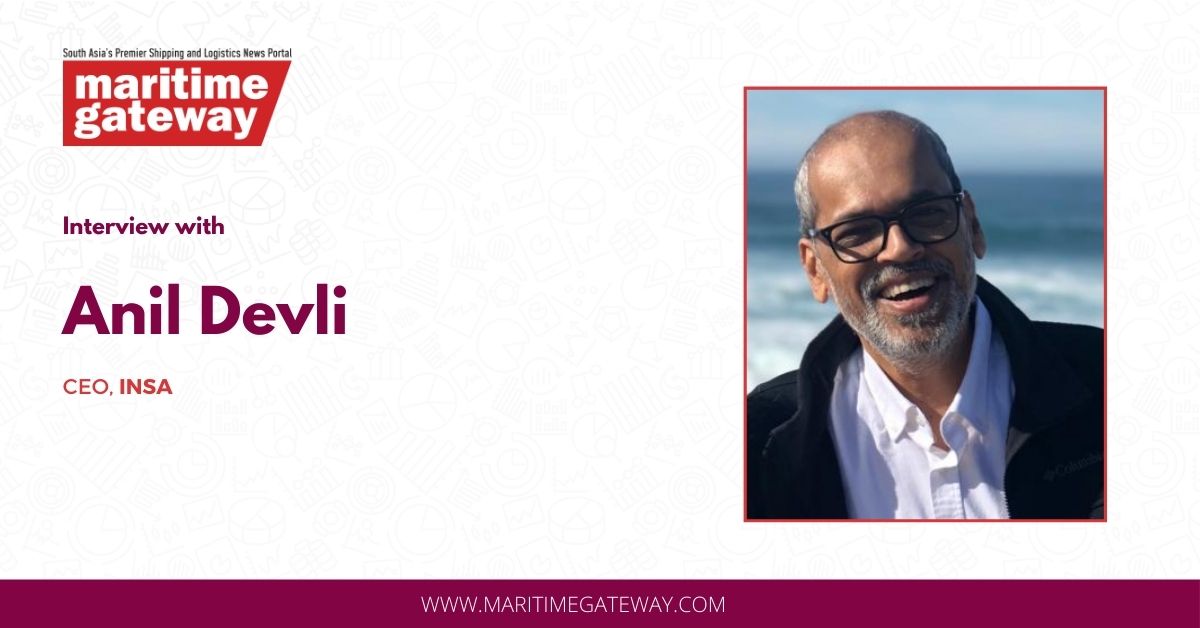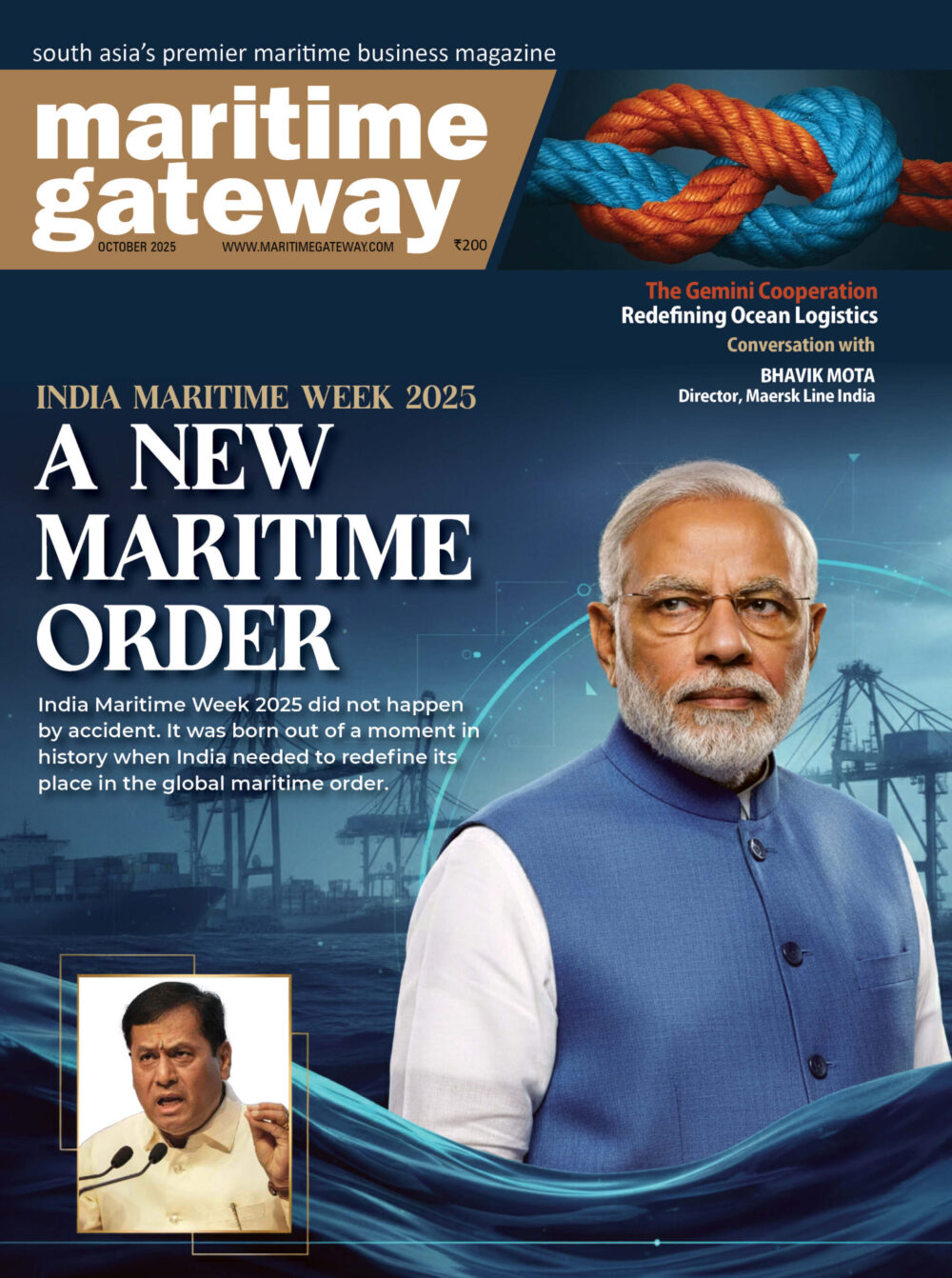While foreign shipping lines skipped Indian ports due to lack of trade, Indian tonnage continued its unabated service to domestic trade. However this front line duty came at a cost, points Anil Devli, CEO, INSA.
What has been the impact of COVID-19 on business and operations of Indian tonnage?
In the aftermath of the pandemic while foreign ships were skipping Indian ports, Indian companies continue to function without even a day’s absence.
However, this frontline duty came at a cost.
Covid-19 related actions impacted operation of Indian ships on four fronts.
First, the advisory issued by the Director General of Shipping vide DGS Order No. 8 of 2020 on March 31st 2020 followed by DGS Order No. 11 of 2020 dated 22nd April 2020 recommended that Indian shipping companies should not to charge, levy or recover any demurrage on cargo owners/consignee of non-containerised cargo due to delay in berthing, loading/unloading operations, etc caused during the period of lockdown due to the COVID-19 situation. This advise has caused great hardship. The DGS Orders, unfortunately, aim to override the sanctity of freedom to contract between two independent parties by favouring one party at the cost of the other.
Cargo interests and consignees, who may also act in their capacity as Charterers, are taking undue advantage and not taking delivery of cargo or needlessly delaying discharge of cargo at ports, using Indian ships as storage receptacles, in the comfort that they are not liable to pay any penalty or demurrage eve if Indian ships are made to wait beyond reasonable periods of time.
However, since foreign shipping companies have refused to follow these instructions, foreign ships could get priority to load/discharge making cargo interests/Charterers liable for demurrages.
Finally, this has ended up penalising the Indian shipping industry alone!
Secondly, the declaration of and extention of the Force Majeure (FM) window for Ports. The initial declaration of this window had already caused fixtures to be delayed. Extention of this window, in our opinion, only served to delay further fixtures of contracts into India which faced uncertainty of performance. Ship owners who were offered contracts to carry cargo into or out of India will factor in the uncertainty arising out of the FM and the increased cost will be paid by Indian trade and commerce.
Some of our members who were offering Tug services faced attempts by private port operators to avoid payment of charter hire under the guise of the FM despite all activities continuing.
The third challenges that Indian shipping was facing was that of managing the sign on and sign off of our seafarers and related issues. While the officers of the DGS have been extremely pro-active in assisting us, dealing with other authorities has been a challenge! Even now, crew change is difficult, but more importantly the cost of crew change has increased between 3 to 5 times!!
The fourth issue impacting shipping operations was in respect of the travel and movement restrictions in the wake of Covid-19 is supplies to ships, including food, medicines and fresh water. Inability to be able to move our repair and service crew, technicians, repair workshops, ship superintendents, specialists providing assistance, vetting inspectors, office staff doing critical works such as IT support was a major challenge. While all this seemed to have settled down, differing guidelines of States have now come up with their own guidelines. This has led to a strange situation where a Service engineer has to quarantine for 7-14 days prior entering a coastal State and after finishing quarantine for another 14 days. This has led to unproductive days becoming a cost either for the Shipowner or the service provider.
Compared to the first 5 months (January to May) of 2019, how has been the business in the first 5 months of 2020, for Indian flagged ships?
Different segments have seen differing impact.
The Coastal container vessels have seen a dramatic fall in capacity utilisation thanks to the lockdown. Existing volumes could not be moved due to lack of road transport facilities and new volumes were absent. This has led to huge losses on such services. The permission given to foreign ships to carry EXIM transhipments cargo has hurt us the most at these times.
The tanker fleet continued to serve the coastal trade as well as imports. However, a lot of them lost earning opportunities or were unable to take advantage of the rising market since receivers/charterers were not taking delivery of cargo and could have suffered as storage receptacles.
The bulk trade worldwide has been impacted and has seen some new lows though currently some green shoots are reported by trade managers.
The other sectors remain steady.
What has been the effect on trade and connectivity with Southeast Asian neighbours – Bangladesh, Sri Lanka, and Myanmar?
Connectivity across sea remain intact during COVID but because of issues on land, the sea legs of cargo movement got affected. Quarantine and health precaution related issues did cause hindrance. Lockdowns of course meant that cargo/demand had dried up.
Availability and change of crew has been an ongoing issue during this pandemic. What is the scenario for ships flagged in India?
In spite of very proactive steps and continuous monitoring with initiatives by DGS Indian crew and companies faced same challenge as any other country. Local officers of certain States, Health, Police and others displayed amazing apathy and lack of concern or even basic human sensitivities, let alone consideration of the fact that here was a seafarer who was going back home to his family. For instance, some of our crew members have had to wait for hours on the roadside thanks to an uninformed action by an agency. Intermediaries sprung up offering to find solutions but our DG Shri Amitabh Kumar and the Officers of the DGS/MMD had been wonderfully proactive, regularly in touch with the industry, personally speaking to State officers and through a regular consultative process, issuing SoPs. The Fleet Personnel Managers of our companies have learnt the meaning of ‘patience’ and we salute their silent endeavour to carry out smooth crew changes.
It would be useful to highlight here that the cost of crew change has increased by 3 to 5 times now, not to speak of the immense hardship and uncertainty that a Fleet personnel manager and the seafarer is facing in the course of his returning home or reporting for duties.
Suffice to say, one needs to be a seafarer or have a close family member as seafarer or be a crew manager to understand the gravity of issue.
What are your suggestions on behalf of INSA to make necessary policy changes to deal with emergencies like COVID-19?
Speaking for the industry, we would echo the direction given by our Prime Minister. The voice for local industry needs to see itself grow – Go Vocal for Local. We look forward to policies that would lead to growth of the Indian maritime industry, be it ship owning, ship repair, ship building, marine services, insurance, freight forwarders, Custom Brokers, Multimodal operators, NVOs, lawyers, Insurance service providers, news & media…..the list can go on. The more local service providers and industry we have, the better will be out ability to deal with such threats to our economy and life in general.
Indian flagged ships have always complained about high operational and fuel cost as compared to their foreign counterparts. With fuel costs falling, what is the scenario?
Nothing has changed. In fact, the Coastal trade serviced by Indian companies, on a continuous basis, have not got the same proportionate reduction in costs of Marine fuel oil that a ship on an international trade has received. This is because, the prices of Marine Fuel Oil in India are controlled and Indian ships will continue to face this disadvantage so long as Marine Fuel Oil is not linked to a market discovered rate. Costs have fallen worldwide but not in India. Look back at what you pay at the pump for your car or bike, that has not changed has it?









